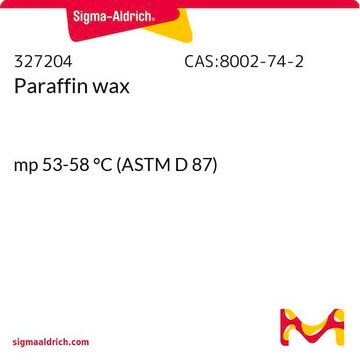1.07164
Paraffin pastilles
solidification point about 56-58°C for histology
Synonym(e):
Paraffin
About This Item
Empfohlene Produkte
Qualitätsniveau
Form
solid
Wirksamkeit
>5000 mg/kg LD50, oral (Rat)
>3000 mg/kg LD50, skin (Rabbit)
IVD
for in vitro diagnostic use
Farbe
white
kinematic viscosity
4.2 cSt(100 °C)
Übergangstemp.
flash point >100 °C
Dichte
0.9 g/cm3 at 20 °C
Anwendung(en)
diagnostic assay manufacturing
hematology
histology
Lagertemp.
15-25°C
Allgemeine Beschreibung
Anwendung
- Clinical application of targeted tumour sequencing tests for detecting ERBB2 amplification and optimizing anti-HER2 therapy in gastric cancer.: This study demonstrates the use of paraffin-embedded tissue samples in targeted tumor sequencing to identify patients suitable for anti-HER2 therapy, highlighting paraffin′s utility in preserving sample integrity for genetic analysis (Ichikawa et al., 2024).
- Novel FFPE proteomics method suggests prolactin induced protein as hormone induced cytoskeleton remodeling spatial biomarker.: Describes a novel proteomics method using formalin-fixed paraffin-embedded (FFPE) samples to identify biomarkers for hormone-induced changes in cellular structures, advancing tissue-specific molecular diagnostics (Faktor et al., 2024).
- TSWIFT, a novel method for iterative staining of embedded and mounted human brain sections.: Introduces TSWIFT, a new technique for the iterative staining of paraffin-embedded human brain sections, providing enhanced imaging capabilities for neurological research (Porter et al., 2024).
- [Optimal melanin removal methods for HE staining, immunohistochemistry and molecular detection].: Investigates various methods for melanin removal in HE staining processes involving paraffin-embedded samples, crucial for accurate histopathological and immunohistochemical analyses (Zhang et al., 2024).
- Novel Histopathological Findings of Micro Bone Fragments and Epithelial Response in the Oral Mucosa in Bisphosphonate-Related Osteonecrosis of the Jaw.: This case report utilizes paraffin-embedded sections to uncover novel histopathological insights into osteonecrosis, demonstrating paraffin′s role in detailed structural analysis in pathological conditions (Koizumi et al., 2024).
Lagerklassenschlüssel
11 - Combustible Solids
WGK
nwg
Flammpunkt (°F)
Not applicable
Flammpunkt (°C)
Not applicable
Analysenzertifikate (COA)
Suchen Sie nach Analysenzertifikate (COA), indem Sie die Lot-/Chargennummer des Produkts eingeben. Lot- und Chargennummern sind auf dem Produktetikett hinter den Wörtern ‘Lot’ oder ‘Batch’ (Lot oder Charge) zu finden.
Besitzen Sie dieses Produkt bereits?
In der Dokumentenbibliothek finden Sie die Dokumentation zu den Produkten, die Sie kürzlich erworben haben.
Kunden haben sich ebenfalls angesehen
Verwandter Inhalt
Informationen zur wichtigen Bedeutung der Färbung biologischer Gewebe für die Forschung und klinische Pathologie unter Anwendung von Standardfärbungen und spezieller Färbemittel und Farbstoffe.
Learn about the criticality of biological tissue staining for research and clinical pathology using standard and special stains and dyes.
Unser Team von Wissenschaftlern verfügt über Erfahrung in allen Forschungsbereichen einschließlich Life Science, Materialwissenschaften, chemischer Synthese, Chromatographie, Analytik und vielen mehr..
Setzen Sie sich mit dem technischen Dienst in Verbindung.










